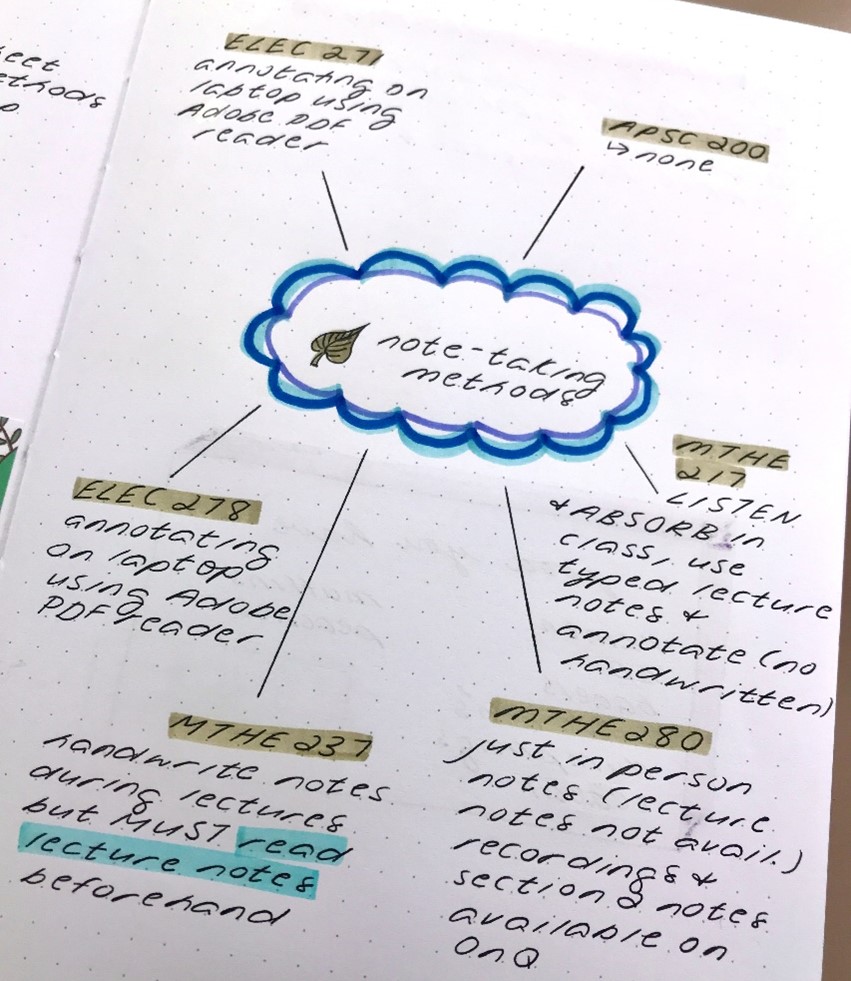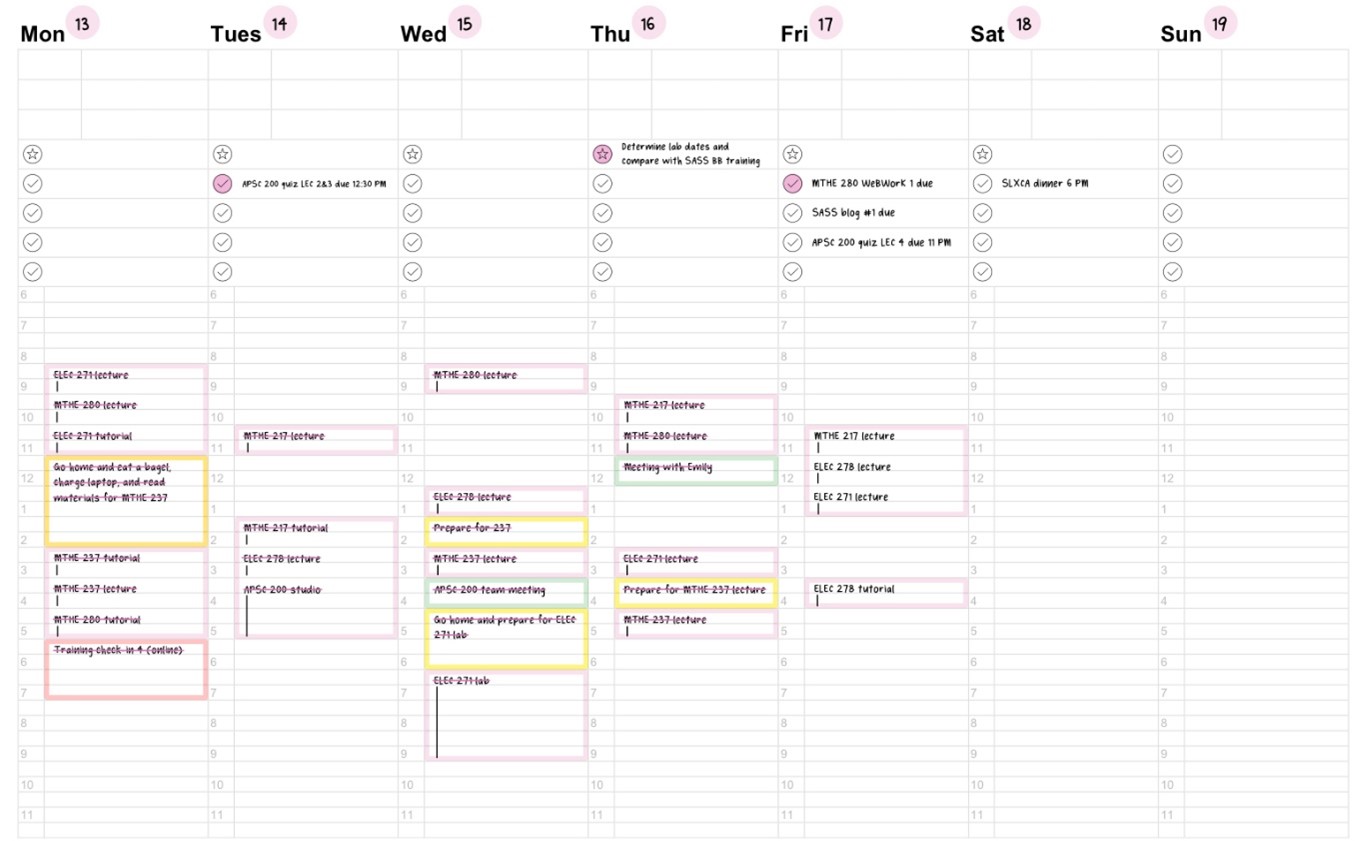Wow, I cannot believe it has been two weeks since I moved to Kingston and the school year started. It feels like two months have passed. I’ve already done so many things, met so many people, and become so integrated into campus life that I can’t believe I’ve done it all within two weeks. It feels like I’ve been here forever.
I’ve made new friends, been added to study group chats, and had a fun night of poker with my new neighbours. I’ve been keeping healthy, taking an average of 14,000 steps per day walking back and forth around campus. In terms of school life, I have learned so much content and I feel like I have become more productive than I was last year.
In my last blog, I wrote about my many goals: procrastination and motivation, finding my best study methods, and time management. I find that being on campus naturally subdues my procrastination. Living on campus helps me have a study mindset that was difficult to get into when I was learning from home last year. A few weeks ago, I toured all the Queen’s libraries with my friend to find the one I could call home for the next three years. The law library is my favourite, but keep that a secret between you and me; I’m afraid it’ll be overrun with students if they all know how beautiful it is. I also love going to Stauffer to study after dinner when it’s a bit quieter. You’ll often find me on the first floor in the evenings—though I know the dangers of staying up late studying, so I try to be careful!
Before the school year started, I read up on SASS’ learning strategies. Two that I’m implementing right now are preview and spaced practice (from Maximizing Your Memory). I’m currently taking many challenging courses, and for some classes, like differential equations, it’s difficult for me to understand when I walk blindly into the lecture. To aid in my comprehension, I read and annotate the lecture notes before the class to understand what’s going on. To compare, it’s like driving down an utterly unfamiliar road versus driving down a road you’ve already taken once. Although you didn’t memorize the directions perfectly, you feel a bit more comfortable and familiar with going that route than you did the first time.

I try and stay active during lectures, but I need to improve my listening comprehension while taking notes. I definitely cannot do both at once, so reading before class is essential. Previewing content also helps with spaced practice (short review sessions over multiple days or weeks rather than cramming) since I generally review old content before reading new content. I haven’t noticed a substantial change in results yet, but I’m looking forward to see how this method will help over time!
I also like spaced practice because it keeps me motivated and focused. It seems like the ideal amount of time to study per period is no more than 3 hours because, after a while, we get distracted and can’t focus. I use the Pomodoro method of working (being “on”) 25 minutes and then a break (being “off”) for 10 minutes. Some people do “on” for 20 minutes and “off” for 5, or “on” for 50 minutes and “off” for 15. Each person works effectively in different ways, but we all need breaks to reward ourselves and continue focusing. I find that taking breaks when cramming makes me feel guilty, whereas gaps in spaced practice do not (since I’m supposed to be spacing out my work for better learning, anyway). So try spaced practice—it’s way better than those long cramming sessions!
When I plan time to study or preview lecture notes, I use the weekly calendar that I made. I block sections of my daily schedule (which is within my weekly calendar) to easily see the time I have throughout the day. I like to see the occupied and unoccupied spaces I have in my calendar to gauge what I can and can’t do within a day. I used to have to-do lists, but they didn’t allow me to see the exact times I had available, so I quickly became overwhelmed. I know that many students use Google Calendar or the SASS weekly calendar to block off time. They’re great methods to schedule out your days and weeks and ensure you have time to complete the tasks you want to do. Time-blocking is probably one of my favourite things about organizing!

My last thought: a lot of things can change within a short period. Just last month, I finished my summer exams in Guelph, enjoyed the remnants of the summer, and got ready for my second year of university. Now, I feel like I’ve had entirely new study habits just because of a new environment and a tweak of scheduling and learning strategies. By the next time you hear from me, I’ll have submitted a 10-page report with my APSC 200 project teammates, started intramural volleyball, and probably met a lot more people.
I’m looking forward to the good changes in your next few weeks too. Let’s make them great changes! 😊
I’ll see you next time, Gaels! – Liyi